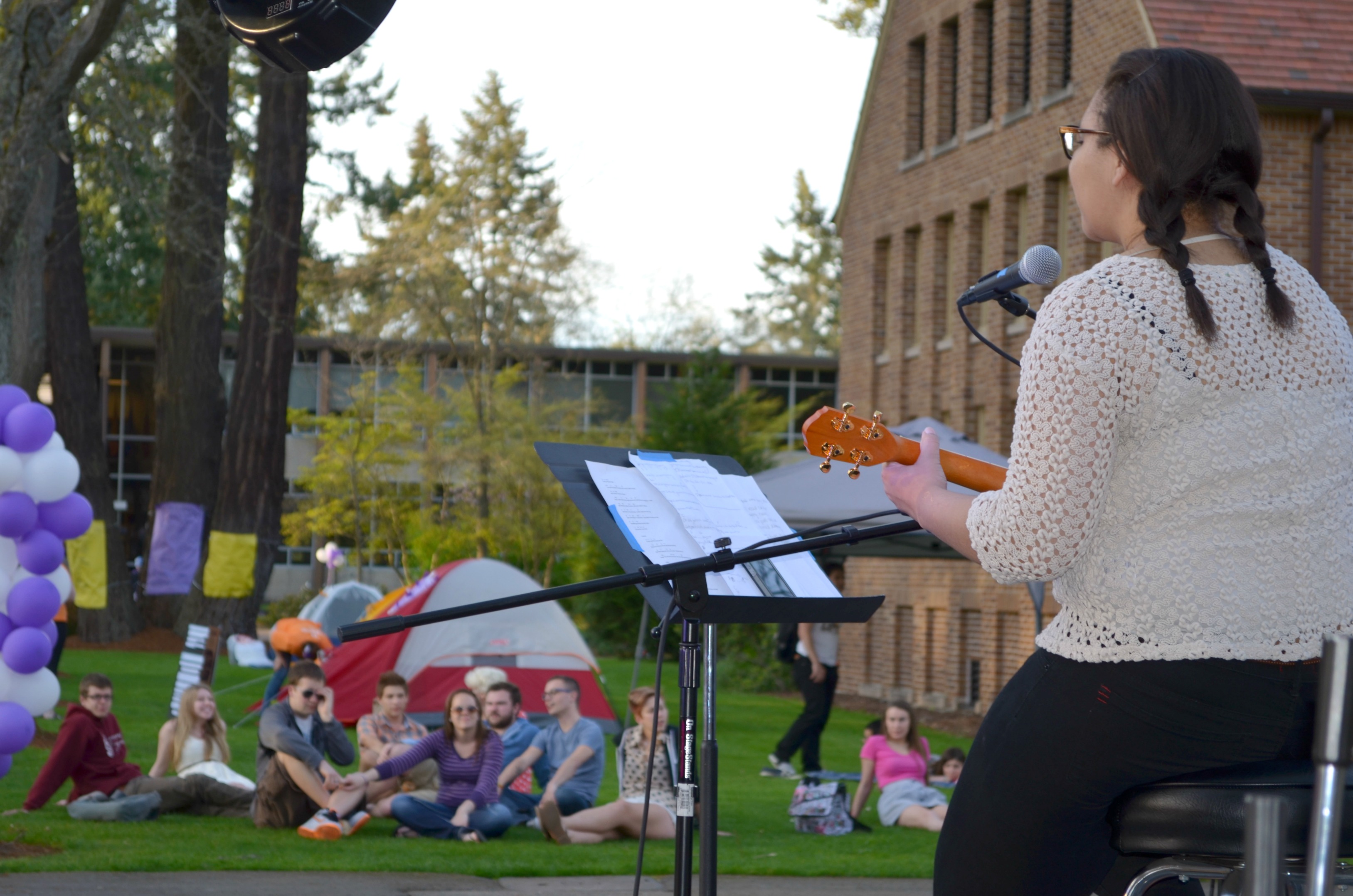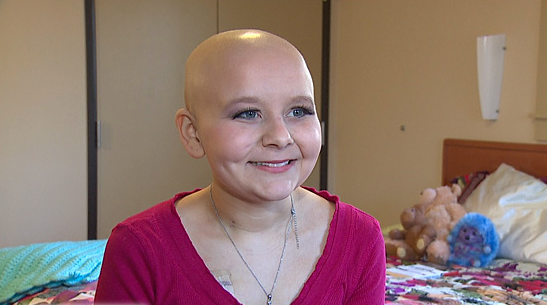By Derek Gibson
Guest Writer
Editor’s note: PLU student Derek Gibson recently interviewed Central Washington University student Shayla Zartman and her father, Selwyn Jones. Shayla is George Floyd’s cousin, and Jones is his uncle. The following transcript has been lightly edited for clarity.
I met Shayla Zartman last year at a college party. At the time, we had no idea that in a less than a year the world would be chanting the name of her cousin George Floyd, who died May 25 in Minneapolis, handcuffed in the street, a police officer kneeling on his neck for almost nine minutes.
Shayla and her father, Selwyn Jones, Floyd’s uncle, spoke with me on June 4, shortly after a memorial service in Minneapolis, and a week of protests throughout the nation. What was it like for her family to sit in the eye of a national hurricane? How did it feel to see their family member, who they called “Perry,” become a national symbol of resistance?
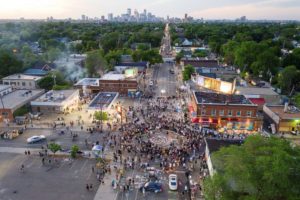
Q: We see videos of black men and women being brutalized or killed by police too often. How does it feel to know the person in the video?
ZARTMAN: “I just saw it becoming another headline. When I first saw the videos I thought ‘Wow, these are awful,’ just like anybody else. But when we found out it was one of our people? We have such a big family who are direct descendants of slavery, so I will tell you it felt like WE were choking.”
JONES: “Shocking. Absolutely shocking. There are 460 million people in the United States. How is it possible that my nephew was the victim? It’s absolutely horrifying waking up, looking at the TV and thinking ’That’s in Minneapolis? That man looks like Perry.’ I’m sitting there looking right at it and my wife is trying to convince me it’s not him, but it wasn’t until my sister called and asked me, ’Have you seen what they did to Perry?’ that I knew. How is it to watch another human being die in the street for.. what was it? Twenty dollars? Absolutely horrendous. But, he can breathe now; he’s sitting up there with his mama and my mama, probably talking smack. I guarantee he’s got a smile on his face.”
Q: How does it feel that people are siding with your family by the millions not only in America, but throughout the world?
JONES: “I’ve been to two or three rallies. The feeling I got watching all of those people come to support my nephew… hearing them chant his name ‘George Floyd! George Floyd!’ It was the best sound of music I’ve heard in my life. It breaks my heart, though, because at the end of the day all of those people get to go home. They get to have barbecues and enjoy their family, but Perry doesn’t get to do that. It breaks my heart.”
ZARTMAN: “It’s honestly incredible. We visited the site where it happened today and there were 5,000 people there to support my family. Everybody kept telling us they were with us. It’s like he was the trigger that blew up this entire thing. I try to stay up on these things and stay involved, but the fact that it’s my family… it’s just so crazy.”
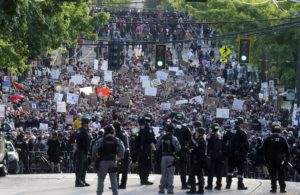
Q: You mentioned that you try to stay involved and up to date with what’s happening. Have you followed any other cases where victims have claimed they couldn’t breathe, such as Eric Garner, or more recently Manuel Ellis in Tacoma?
ZARTMAN: “I got to meet Eric Garner’s mom today at the memorial. I felt so heartbroken for her. She had to watch what happened to her son happen to somebody else’s son. The way that it happened is so horrific for it to have happened before. As for Manuel Ellis, I was aware that that one happened and I don’t know all the details, but it’s another terrible act committed by police.”
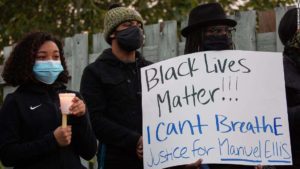
Q: For the first time in United States history there are protests in all 50 states. There have also been protests in 18 other countries around the world. A large part of the media is focused upon George specifically, but it is clearly much bigger than that. What do you say to people who believe this is an isolated incident?
ZARTMAN: “I would say you need to wake up. If you talk to any person of color every single one of us has had a different experience. Just because you have not felt these things does not mean they are not real and they are not happening. I have a large family, so one thing we do is we tell everybody that we’re related to him. This brings a lot of people closer to the situation, like ‘Oh, I know that guys cousin,’ for example brings somebody much closer to what’s happening and suddenly they are part of it all.”
Q: As we know, systematic racism is not a new issue. Your generation fought it, as well as your parents, grandparents and great-grandparents. Now, your children and the generation of your children are taking the issue head on. Do you have any advice for Shayla and everybody like Shayla as they attempt to take this massive leap forward?
JONES: “Keep your eyes open. Keep your head up. Evil can rear its ugly head at any time. What we saw on May 25 was pure evil and hatred. I’m not mad at the police, I just hope that the judicial system does its job and those men are incarcerated for a long time.”
Q: Have you thought about how you would react if they were acquitted?
JONES: “What is going to happen if they are acquitted is total destruction. You think the people have spoken? They haven’t said nothing yet, man. When you grow up you’re taught that the policeman are authority and you do everything they tell you, and guess what? You die. That makes you not want to do anything. If somebody told me they were going to kill me… that they were going to put their knee on the back of my neck and kill me… I would’ve never let them do that! If they told Perry that he was going to die then he would have fought back, but you are taught to respect authority, so he didn’t fight back. Perry didn’t have a choice. I think that Perry died for a reason. To give us an opportunity and a stage to show the world how malicious and evil people are. With that video I believe that we can change the world. I believe that there have been enough people touched and enough people impacted that we can really make a change.”
Q: Shayla, I know that you have taken this tragedy as an opportunity to personally get involved, such as speaking with the Gig Harbor Police Chief about police brutality in your local area. What would you like to see happen from your activism and how can others help you achieve these goals?
ZARTMAN: “I haven’t had the chance to reassess where I want to go yet, but I know that we need reform. For one, police essentially have a tenure program just like college professors. We need to eliminate this, so my family has hired Ben Crump to represent us in a hearing in August for that cause. Ben Crump was lawyer for Tamir Rice and Michael Brown. I also encourage everybody to vote, and you can’t just vote for a party anymore. We need to be electing people who can make a change and will fight for what we actually want. I also want white people to continue checking their privilege. You need to recognize and see what privilege is. It’s really all about conversation, and there is no staying out of this. White people are heard on a greater magnitude than black people, so we need your voices defending us.”
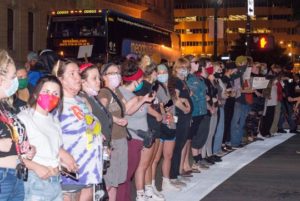
Q: Is there anything that you would like the world to know about George?
JONES: “Every time I saw him I remember him smack talking. We used to play football and I remember every year he’d get bigger and bigger until one year he was bigger than me. I remember that because he was smack talking and he could finally pick me up and toss me around. He was a big ol’ monster like 6’6” and 240 pounds. Just a rock. The pictures don’t do him justice, that video doesn’t do him justice. He always smiled. I remember being with him and it’d be 145 degrees outside and he’d be smiling and I’d say ‘Man what the hell you smiling for? It’s hot!’”
Q: What should we think of when we think of George Floyd not only now, but in 25 years?
JONES: “When George Floyd’s name comes to the tip of your tongue, now or in 25 years from now, you should think of a man who died for equality and a man who died for a change. I’m not going to let him die in vain. I will not let his memory go.”
Q: Is there anything that you would like to add before we wrap up?
ZARTMAN: “There needs to be a separation between the people who are protesting and the opportunists who are looting and rioting. Be careful. Everybody needs to be careful. These are two very different groups.”

















